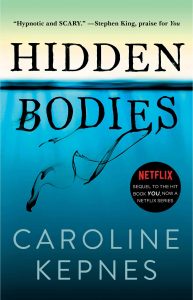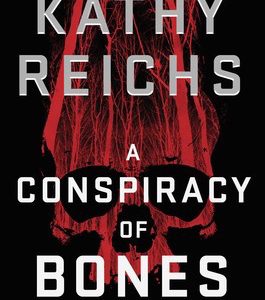Last year, The Writer published a piece about the rise of “strong, interesting, complex female characters” in crime thrillers. The article, written by Jacqueline Sheehan, profiled two male writers about the phenomenon that “offer[s] way more than sex appeal”.
“I interviewed two male authors who excel at their craft with can’t-put-the-book-down thrillers and create female characters who ring true as human beings. Both authors write a series with a male protagonist, but there is something decidedly different about the protagonist’s view of the world, and women populate their fictional world in varied roles,” Sheehan writes. As if women haven’t been doing that in the genre and fiction more broadly.
“I purposely selected male authors whose protagonists were male because we can see the women of their fictional world through the eyes of the main character,” Sheehan goes on to write.
Instead of female characters written by men, I decided to look at some of the women authors who have written incisive male protagonists in the crime genre, providing insight into their psyches and, thus, the status of women today. These authors are providing a vital service in the #MeToo era by using fiction to help readers understand men’s motivations around sex and relationships and, often, their predilection to commit crime. Some of them reach so far into their protagonist’s minds that they end up out the other side, subverting their book into one about women’s experiences with men.
The Talented Mr. Ripley by Patricia Highsmith
The patron saint of criminal male protagonists, Patricia Highsmith’s Tom Ripley begins his journey through five novels as an everyman. Down on his luck, readers are able to identify with Ripley as his hard work pays off and he becomes the con artist and serial killer he always knew he could be.
“He must have something very important on his mind. Yes, he had. The present and the future of Tom Ripley,” he thinks.
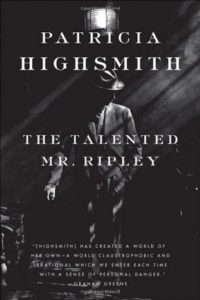 Highsmith’s crafting of a thoroughly likeable yet narcissistic protagonist and his suspenseful efforts to conceal his crimes pre-dates our fixation with the golden age of the anti-hero in TV shows such as The Sopranos and Breaking Bad, and the more recent romanticization of abusive men. “Supposing they got him and gave him the electric chair—could that death equal in pain, or could death itself, at twenty-five, be so tragic, that he could not say that the months from November until now had not been worth it? Certainly not,” Highsmith writes towards the end of the novel when Ripley thinks he’s about to be found out, justifying his heinous actions and going down in a blaze of glory. Ripley’s ability to adapt to the myriad situations he finds himself in lends itself further to our understanding of violent yet charming men.
Highsmith’s crafting of a thoroughly likeable yet narcissistic protagonist and his suspenseful efforts to conceal his crimes pre-dates our fixation with the golden age of the anti-hero in TV shows such as The Sopranos and Breaking Bad, and the more recent romanticization of abusive men. “Supposing they got him and gave him the electric chair—could that death equal in pain, or could death itself, at twenty-five, be so tragic, that he could not say that the months from November until now had not been worth it? Certainly not,” Highsmith writes towards the end of the novel when Ripley thinks he’s about to be found out, justifying his heinous actions and going down in a blaze of glory. Ripley’s ability to adapt to the myriad situations he finds himself in lends itself further to our understanding of violent yet charming men.
The Witch Elm by Tana French
The Witch Elm was the first (I know, I know) Tana French title I read, at the beginning of the year. I was immediately struck by French’s first person portrayal of Toby, with his simultaneous self-righteousness and -loathing, so much so that it became the inspiration for this piece.
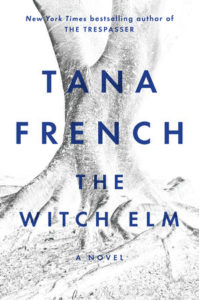 As Toby slowly uncovers the mystery of how the body of his high school friend Dominic ends up inside the Wych Elm in his dead uncle’s house, so to does he discover how, as a straight, white, able-bodied man, he has navigated the world relatively unscathed.
As Toby slowly uncovers the mystery of how the body of his high school friend Dominic ends up inside the Wych Elm in his dead uncle’s house, so to does he discover how, as a straight, white, able-bodied man, he has navigated the world relatively unscathed.
“The point is, if your doctors went all out for you, great. But not everyone gets to live in the same world as you,” Toby’s cousin Susanna chastises him when he doesn’t believe that she was sexually assaulted by her doctor.
That is, until he is the victim of an assault and robbery at the beginning of the hefty tome that leads him to convalesce at his uncle’s house where the bulk of the mystery evolves and forces him to reckon with his privilege.
“Me six months ago, clear eyed and clear voiced, sitting up straight and smart, answering every question promptly and directly and with total unthinking confidence: every cell of me had carried a natural and absolute credibility; accusing me of murder would have been ridiculous,” French writes. “Me now, slurring, babbling, droopy-eyed and drag-footed, jumping and trembling at every word from the detectives: defective, unreliable, lacking any credibility or authority or weight, guilty as hell.”
Through the facade of mystery novels—The Witch Elm is French’s first stand-alone narrative outside of the Dublin Murder Squad saga—French clandestinely lays out what it means to grapple with manhood in the #MeToo era.
You & Hidden Bodies by Caroline Kepnes
On the other side of the coin is Joe Goldberg, the bookshop manager cum stalker from Caroline Kepnes’ You and Hidden Bodies—with a third installment forthcoming—and the runaway Netflix series.
Joe is frightening in the meticulous way he uses every tool at his disposal—social media, the romance industrial complex, his “good guy” facade—and Kepnes should be applauded for how she manages to get into the mind of such a man.
“He could be a serial killer or the nicest guy in the world, but there is no middle ground…” Kepnes, as Joe, writes of Beck’s therapist Dr. Nicky, who was sleeping with Beck and whom Joe frames for her murder. Joe at once has supreme self-awareness of his need to control women while also believing that he is justified in his acts because he only wants to protect Beck.
Of the people I’ve spoken to about You, the response is divided: some, like myself, love the soapy satire of Joe’s derangement, while others feel that it glorifies abusive relationships by always casting Joe as the victor. That’s where Kepnes excels—You, Hidden Bodies et al. is from the perspective of a highly organized and intelligent stalker: he has to be to infiltrate his victim’s lives and psyches so completely.
An American Marriage by Tayari Jones
Tayari Jones worked on An American Marriage, her 2018 bestseller, Women’s Prize for fiction winner and Barack Obama summer reading list recipient, for years before incorporating the perspectives of Roy and Andre, the two men vying for third protagonist Celestial’s love.

Roy’s chapters are written in the form of prison love letters—he was wrongly convicted for rape within a year of marrying Celestial, who has since found success in her doll-making business, while also reconnecting with her childhood best friend, the boy-next-door Andre.
“You don’t know how demoralizing it is to be a man with nothing to offer a woman,” Jones writes from Roy’s perspective. In order to get the tone of his letters right Jones, a life-long letter writer herself, studied letters from incarcerated men during a fellowship at Harvard’s Radcliffe Institute in 2011.
An American Marriage grapples with wrongful imprisonment, mass incarceration, the expectations of black women to “stand by their man” and, just as interestingly, black masculinity.
In a Lonely Place by Dorothy B. Hughes
A clear inspiration for authors like Kepnes, Megan Abbott and perhaps even for Bret Easton Ellis’ American Pyscho Patrick Bateman, Dorothy B. Hughes was an early pioneer of writing from a sociopathic man’s perspective.
 But where an author like Easton Ellis revels in the violence of his disturbed protagonist, Hughes doesn’t dwell on the violence wrought by Dix Steele, instead focusing on his inner life to craft a portrait of a seriously disturbed man. Also different from Bateman’s affluence is Dix’s hatred of the haves: those who move through the world with the conveniences wealth affords them, those to whom interpersonal relationships come easily and the newfound economic freedom of women.
But where an author like Easton Ellis revels in the violence of his disturbed protagonist, Hughes doesn’t dwell on the violence wrought by Dix Steele, instead focusing on his inner life to craft a portrait of a seriously disturbed man. Also different from Bateman’s affluence is Dix’s hatred of the haves: those who move through the world with the conveniences wealth affords them, those to whom interpersonal relationships come easily and the newfound economic freedom of women.
“The war years were the first happy years he’s ever known. You didn’t have to kowtow to the stinking rich, you were all equal in pay; and before long you were the rich guy. Because you didn’t give a damn and you were the best God-damned pilot in the company with promotions coming fast. You wore swell tailored uniforms, high polish on your shoes. You didn’t need a car, you had something better, sleek powerful planes. You were the Mister, you were what you’d always wanted to be, class. You could have any woman you wanted in Africa or India or England or Australia or the United States, or any place in the world. The world was yours.”
He also hates women, and embarks on a crime spree across Los Angeles, targeting women both compulsively and calculatedly.
It is in this way that Hughes was one of the first to portray male entitlement and its connection to gendered violence as we understand it today, all the way back in 1947.
Song of Solomon by Toni Morrison
Abuse, both immediate and inherited, ruminate throughout the life and lineage of Milkman, the protagonist of Toni Morrison’s third book, Song of Solomon, which uses the biblical story of the same name to explore themes of slavery and racial injustice.
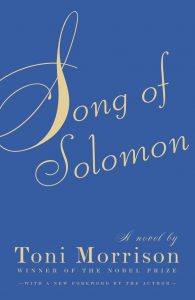 In one scene, Milkman’s sister Magdalene—Lena for short—confronts Milkman for outing his other sister Corinthians’ lover as a member of the Seven Days group, which murders white people.
In one scene, Milkman’s sister Magdalene—Lena for short—confronts Milkman for outing his other sister Corinthians’ lover as a member of the Seven Days group, which murders white people.
“You have yet to wash your own underwear, spread a bed, wipe the ring from your tub, or move a fleck of your dirt from one place to another. And to this day, you have never asked one of us if we were tired, or sad, or wanted a cup of coffee. You’ve never picked up anything heavier than your own feet, or solved a problem harder than fourth-grade arithmetic. Where do you get the right to decide our lives?” Lena spits at Milkman.
Like many of the books on this list, Morrison uses Milkman’s relatively privilege in comparison to the women in his life and his ignorance of their plight as somewhat of a Trojan horse: The Song of Solomon might be Milkman’s story, but it’s actually about women’s stories.
Fleishman Is in Trouble by Taffy Brodesser-Akner
Not strictly a crime novel, though crimes are committed in the periphery of protagonist Toby Fleishman’s life: abuse by doctors, tween sexting scandals, marriage.
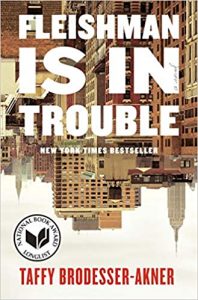 Taffy Brodesser-Akner crafts a parallel between Fleishman’s newly-divorced dating app gallivanting and the pressures of social media and sexting on young girls in her debut novel.
Taffy Brodesser-Akner crafts a parallel between Fleishman’s newly-divorced dating app gallivanting and the pressures of social media and sexting on young girls in her debut novel.
“He waited while she considered her response [to his sext], and in that maybe twenty-three seconds (or three minutes or two seconds, he couldn’t say, he only experienced that time as a fever), he experienced regret, shame, revulsion, self-loathing…” she writes of her neurotic Jewish protagonist, narrated by Fleishman’s college friend Libby who bridges the twin storylines of Fleishman’s abandonment by his estranged wife Rachel and his estranged wife Rachel’s abandonment.
“He had to look away from the phone in order to restore her to personhood… and only briefly did he think to wonder if he was doing his job of thinking of the women he dated as people,” she writes of another sexting encounter.
The third and final part of the book elevates Libby’s voice who, at times, I forgot was even narrating the book and I became puzzled by her abrupt insertion of herself into Fleishman’s escapades. A men’s magazine writer, like Brodesser-Akner herself, Libby laments her choice to be a stay-at-home mom in the suburbs, a quiet rage at her husband and all men, really, simmering to a boil as we realize the titular Fleishman who is in trouble is not really Toby after all, but Rachel and, by extension, all women who are deemed “too much.”



